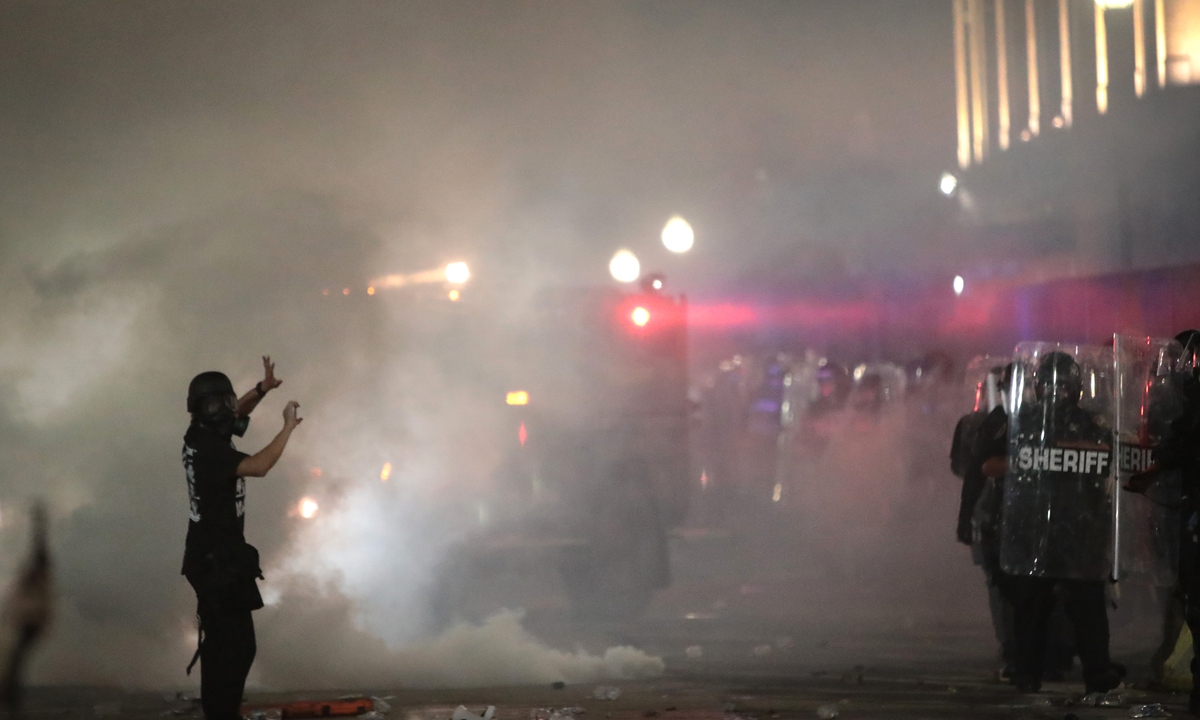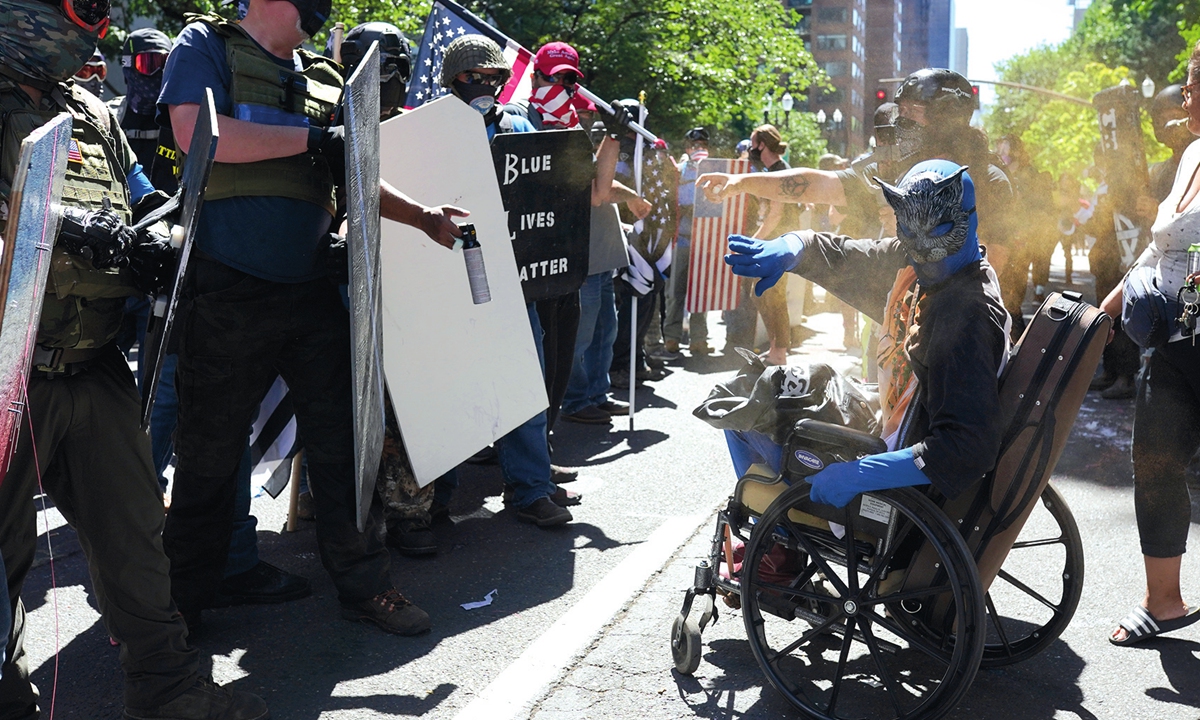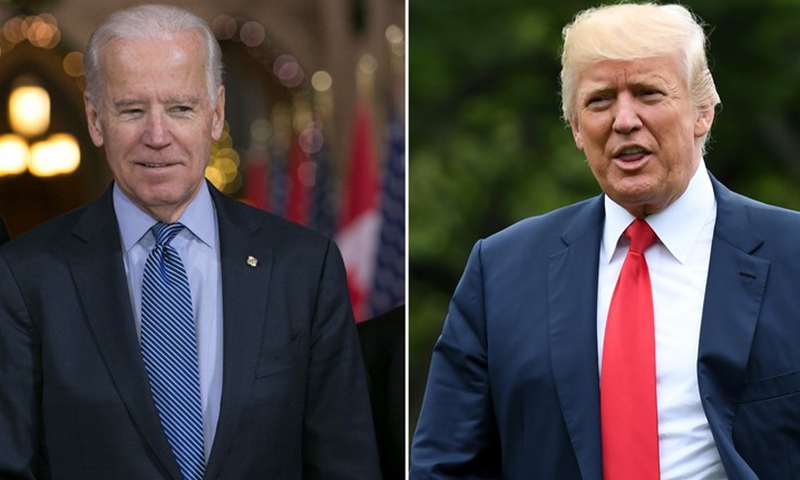Fierce political struggle drives electoral violence, disrupts lives as US vote draws close
By Huang Lanlan and Lin Xiaoyi Source: Global Times Published: 2020/9/7 19:31:31

As tear gas fills the air, demonstrators confront police in front of the Kenosha County Courthouse during a third night of unrest on August 25, 2020 in Kenosha, Wisconsin. Photo: AFP
As Republicans and Democrats engage in a partisan war of words ahead of the presidential election in November, the general US public seems to have got tired of the chaos, clashes and violence related to the election across the country. Observers and US citizens reached by the Global Times said this year's presidential election is probably the most violent and confrontational one in decades due to the tense political struggle between the two parties and the growing domestic chaos amid the COVID-19 pandemic.
Anger and anxiety spread throughout the US last week when Aaron Danielson was shot dead amid "clashes between Trump's supporters and [Black Lives Matter (BLM)] protesters" in downtown Portland, Oregon on August 29 local time, police said. The shooting comes days after Jacob Blake was shot and seriously injured by police in Kenosha, Wisconsin.
Increasing violence in the US ahead of the election is a result of the fierce rivalry between the Republican Party and Democratic Party, experts on US issues said.
Trump's polarizing style in office, coupled with the Democrats' animosity toward Republicans after the defeat in the 2016 election, have left the two parties increasingly divided and unable to compromise on various issues, Yuan Zheng, senior fellow of the Institute of American Studies at Chinese Academy of Social Sciences (CASS), told the Global Times.

Right-wing protesters pepper spray an anti-police protester during a rally in Portland on August 22. Photo: AFP
Play the blame gameMany US Twitter users expressed their concerns after the Portland shooting over the increasingly violent social situation, condemning the Trump and Biden campaigns for playing on the violence.
"Be prepared for this election to become violent," posted user Frederick Joseph on August 30. "Kenosha and Portland are likely just the beginning."
Joseph, a New York resident and author of the forthcoming book The Black Friend, said the Portland shooting case was obviously electoral violence. "I feel that the electoral violence in the US right now hasn't been this heightened since the 1960s," he told the Global Times.
Joseph said he personally encountered election-related violence this year - two men fighting over a Trump flag hanging from the back of one of the men's cars. He complained the violence happening in the US over the last few months "has been not only antagonized but glorified by Trump," who has deployed federal forces to some cities in response to BLM protests.
At a press conference on August 30, Portland's Democratic mayor Ted Wheeler castigated Trump for "having created the hate and the division" that has led to the highest level of violence in decades. Trump later fired back on Twitter, threatening to send more federal law enforcement into Portland.
The deployment of forces is not to reduce but to aggravate the US' electoral violence, said Zhu Feng, director of Institute of International Studies under Nanjing University.
The Trump administration is attempting to fuel its "law and order" narrative with the violence to show the public that he is needed in office, Zhu analyzed.
The growing violence has scared many US citizens, especially minorities. Xu Deqing, a Chinese American living in North Haven, Connecticut, said he felt the fear and concern of minority groups around him.
"Connecticut has strict gun-control rules, but a lot of my friends have bought guns in the hope of protecting themselves," Xu told the Global Times, saying he has frequently seen vulgar verbal attacks among supporters of the two presidential candidates on social media.
The fierce rivalry between Republicans and the Democrats has also disrupted the daily lives of citizens like Xu, who said each day he receives at least 10 emails or phone calls asking him to donate money or vote. "Both sides say they are at their 'most dangerous moment' and are trying everything they can to boost turnout among their supporters," he added.
An August 26 poll conducted by Reuters and Ipsos put Biden at 47 percent to Trump's 40 percent among registered voters, CNN reported on Sunday.
While the two campaigns consistently point fingers at each other, riots keep occurring across the US because people have "accumulated a lot of discontent," said Matthew, a PhD student at the University of Illinois living in Chicago.
"Democrats and Republicans are only indulging in political struggle, and they even use violence as a weapon to guide public opinion," Matthew told the Global Times. "The two play up that 'the whole society is at risk' and compete against each other to see who is doing worse."
Xu noted Barack Obama once compared Democrats and Republicans to Coca-Cola and Pepsi, suggesting there were no big differences between the two.
"But now, the gap between them is widening and both sides consider the election as a life-or-death struggle," he remarked. "This is one of the saddest things in the US-style democratic politics."

Combo photo shows former US Vice President Joe Biden (L) and US President Donald Trump attending their respective events on different occasions. Photo:Xinhua
'More violence will occur'
The next two months till the election on November 3 are "widely expected to be one of the most turbulent and chaotic periods in modern American history," said Associated Press on August 31.
"The unrest has only been bolstered this year by frustrations over the [Trump administration's] handling of the COVID-19 pandemic," Joseph said. The pandemic has reportedly killed more than 185,000 Americans and caused tens of thousands of workers to lose their jobs in a stagnant economy.
"I do believe more violence will occur," Joseph told the Global Times.
Kerri Kennedy, an American Friends Service Committee (AFSC) member engaged in researching and preventing global electoral violence, warned in her recent article the election may see "disruptions including possible violence."
As AFSC's associate general secretary for international programs, Kennedy said she has spent years working on stopping election violence in Africa. But now "this work is becoming increasingly relevant [back in the US]," she told the Global Times.
Key criteria that make election violence most likely to take place include weak electoral management bodies and lack of a multiparty effort for election integrity, Kennedy wrote in an article published by Newsweek in August.
"We saw massive voter suppression in the primaries," she wrote, mentioning the Trump administration's removal of mail sorting equipment and order to slow down mail deliveries, which have outraged citizens. In Kentucky, public officials closed polling sites and expected 700,000 mostly Black residents to vote in a single location, she said.
"We need a fair presidential election," said Matthew, calling for measures like guaranteeing the effectiveness of the Federal Election Commission (FEC) and fully disclosing the sources and uses of Political Action Committee (PAC) funding.
Joseph asks for accountability for the violence. "If there are no repercussions for murdering people, it will continue," he said.
Worse still, the US electoral system does not provide an effective approach to its domestic chaos, observers found. "The two campaigns are trying so hard to cover up their ineptitude and attack their rivals, while having little time to really push for a solution," Yuan told the Global Times.
As many as 61 percent of Americans thought the US is on the wrong track, according to a poll released in August by The Economist and data company YouGov.
The sharp social spear in the US cannot be solved in the short term, Matthew said. "At [this] moment, we have no choice but to focus on the election, which is frustrating," he said.
Newspaper headline: Ballot bruises
Posted in: IN-DEPTH